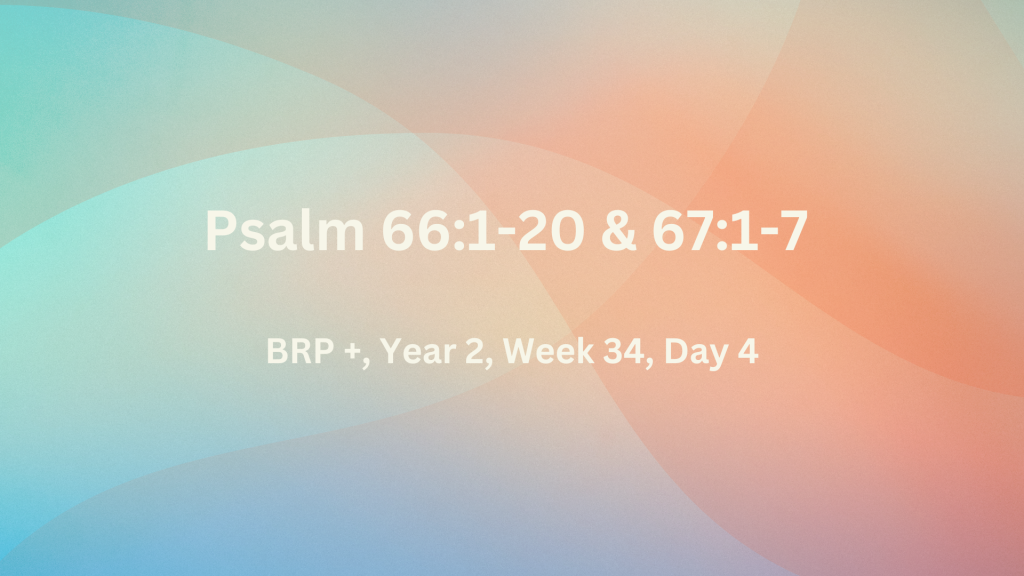Psalm 66:1-2067:1-7
Q.1. What did this song celebrate? Does God’s care preclude oppression? Why did the Psalmist make vows? Did he keep his gratitude to himself? How gracious is God? – (Ps.66:1-20)
This Psalm was written to direct Israel’s attention to God’s sovereign watchfulness over His people, both in the past, and in the present. It also celebrated the nation’s deliverance from their oppression in Egypt. When we consider God’s awesome acts, our hearts should fill with praise to the Lord (Ps.66:1-2). Even Israel’s enemies were forced to acknowledge God’s special care over the nation (Ps.66:3-4). The Psalm recalled how God – turned the sea into dry land … as well as paved a way through the Jordan River, when – they passed through the river on foot (Ps.66:6). The Psalmist included the other nations and declared – He rules by His might forever; His eyes keep watch on the nations (Ps.66:7). The writer wanted the people to understand that God is there amid trials and difficulties, and he reminded them that God – 9 keeps us in life and does not allow our feet to slip. 10 For You have tried us, O God; You have refined us as silver is refined. 11 You brought us into the net; You laid an oppressive burden upon our loins. 12 You made men ride over our heads; We went through fire and through water, yet You brought us out into a place of abundance (Ps.66:9-12). The Psalmist revealed his trust in God, even when he was tested. Through these times, he made vows, and expressed determination to follow through with them – which my lips uttered, and my mouth spoke when I was in distress (Ps.66:14 c.f. Ps.66:13-15). The Psalmist urged Israel not to be silent witnesses, and proclaimed – 16 Come and hear, all who fear God, and I will tell of what He has done for my soul. 17 I cried to Him with my mouth, and He was extolled with my tongue (Ps.66:16-17). He gave an important principle to help us in praying – If I regard wickedness in my heart, the Lord will not hear (Ps.66:18). With a clear conscience, we can be confident – 19 But certainly God has heard; He has given heed to the voice of my prayer. 20 Blessed be God, Who has not turned away my prayer nor His lovingkindness from me (Ps.66:19-20 c.f. 1 Jn.3:21-22; 5:14-15).
Q.2. Why did the Psalmist seek the Lord’s blessing? Whom does God’s blessing benefit? What characterizes God’s rule over the nations? How should we respond to God? – (Ps.67:1-8)
Our prayers and promises to God can often be selfish. This Psalm is generous and extends to all peoples of all nations. The Psalmist sought God’s blessing – God be gracious to us and bless us and cause His face to shine upon us (Ps.67:1). As we read, on we discover that his prayer was for OTHERS – 2 that your way may be known on the earth, Your salvation among all nations …7 God blesses us, that all the ends of the earth may fear Him (Ps.67:2 & 7). He yearned that all – 3 the peoples praise You, O God; Let all the peoples praise You. 4 Let the nations be glad and sing for joy (Ps.67:3-4 c.f. Ps.67:5). Like God Himself, the Psalmist knew that God – will judge the peoples with uprightness and guide the nations on the earth (Ps.67:4). His theme was that God is a good God, and that – the earth has yielded its produce; God, our God, blesses us (Ps.67:6). This Psalm is a beautiful expression of our God, Who sent His One and Only Son to save a lost world. Paul used some of these verses to explain that it has always been God’s intention to reach out in love to the Gentiles (c.f. Rom.15:10-11).

